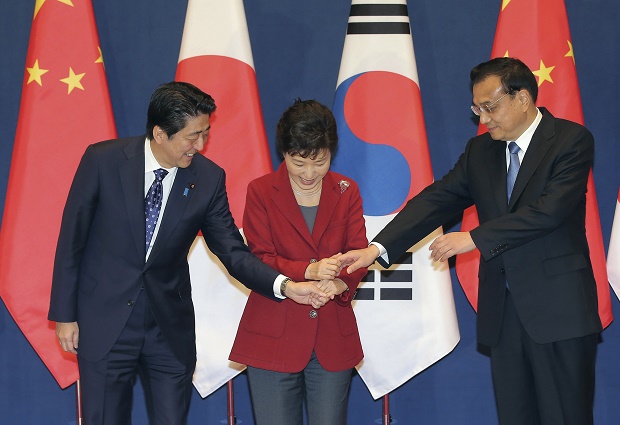
South Korean President Park Geun-hye, center, shakes hands with Japanese Prime Minister Shinzo Abe, left, and Chinese Premier Li Keqiang as they meet to hold a trilateral summit at the presidential house in Seoul, South Korea, Sunday, Nov. 1, 2015. The leaders of South Korea, China and Japan met Sunday in their first summit talks in more than three years, as the Northeast Asian powers struggle to find common ground amid bickering over history and territorial disputes. AP
SEOUL, South Korea — South Korean President Park Geun-Hye was to hold her first summit with Japanese Prime Minister Shinzo Abe on Monday after an extended period of deep diplomatic rancor and mistrust.
The sit down caps a series of moves in recent weeks by Seoul and Tokyo towards a rapprochement — prompted and pushed by their mutual military ally, the United States.
While it is unlikely to mend the many broken fences between the two neighbors, it does mark an important step towards a more pragmatic partnership that is less encumbered by the emotional bitterness of the past.
“Remember this is the first summit between the two countries in nearly four years, so expectations need to be kept in check,” said Hong Hyun-Ik, an analyst at the Sejong Institute think-tank in Seoul.
“What’s important is creating a normal channel for dialogue to pave the way for more working-level discussions and coordination,” Hong said.
Since taking office in February 2013, Park had repeatedly refused to meet one-on-one with Abe, arguing that Tokyo had yet to properly atone for its wartime past and 1910-45 colonial rule over the Korean peninsula.
Park has taken a particularly strong line on the issue of compensation for Korean “comfort women” forcibly recruited to work in Japanese wartime military brothels.
It has been a politically popular stance in South Korea where Abe is suspected of seeking to water down past Japanese apologies for its wartime aggression.
But there is also public support for a summit given the importance of the relationship between the two US military allies, who have strong trade links and a mutual interest in curbing the nuclear weapons ambitions of North Korea.
Their meeting was only confirmed days before amid reports of behind-the-scenes bickering over how Japan’s wartime sex slavery might be addressed, with analysts ruling out any new apology from Abe.
“But he could say something like he will continue to make efforts to help solve the problem. Even a remark like that would be considered progress,” Hong said.
The two leaders participated Sunday in a trilateral summit with Chinese Premier Li Keqiang — the first meeting of its kind in more than three years.
In a joint statement, the leaders vowed to work together again on improving trade and security between the three largest economies in Northeast Asia.
The statement stressed the importance of “facing history squarely” but qualified that reference to old disputes by also underlining the necessity of “advancing towards the future.”